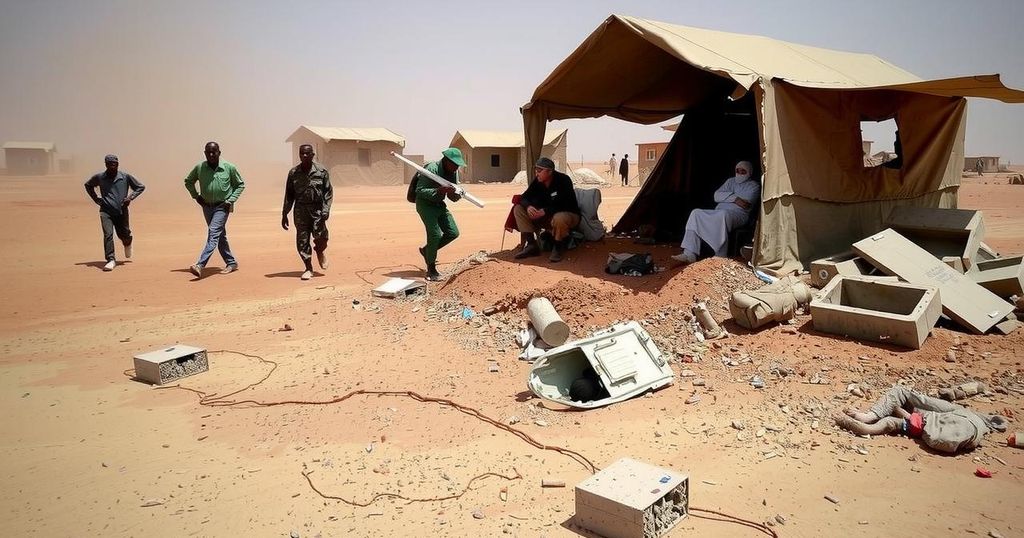Global news
ABD, ABDEL FATTAH AL - BURHAN, AFRICA, CIVIL WAR, CONFLICT, DARFUR, DISPLACEMENT, EL - FASHER, HUMANITARIAN, HUMANITARIAN CRISIS, MOHAMED HAMDAN DAGLO, RAPID SUPPORT FORCES, RSF, SUDAN, TURK, UN, UN HIGH COMMISSIONER FOR HUMAN RIGHTS, UN HUMAN RIGHTS OFFICE, UNITED NATIONS, VOL, VOLKER TURK, WORLD HEALTH ORGANIZATION, ZAMZAM
Isaac Bennett
0 Comments
Over 780 Civilians Killed in Paramilitary Siege in North Darfur, UN Reports
The UN reports over 782 civilian deaths and 1,100 injuries due to a paramilitary siege in North Darfur, Sudan. The brutal conflict pits the Sudanese army against the RSF, leading to severe humanitarian crises, including bombings of hospitals and residential areas. Nearly all of Darfur is now under RSF control, with dire consequences for civilians.
According to a report from the United Nations, at least 782 civilians have been killed, and over 1,100 have sustained injuries amidst a prolonged paramilitary siege in the capital of North Darfur, El-Fasher. The ongoing conflict, which has persisted since April of the previous year, involves fierce clashes between the Sudanese army, led by Abdel Fattah al-Burhan, and the paramilitary Rapid Support Forces (RSF), headed by his former deputy, Mohamed Hamdan Daglo. The city, home to approximately two million residents, has been the site of significant violence as the army strives to maintain its last foothold in the Darfur region.
In a statement, UN High Commissioner for Human Rights Volker Turk emphasized the dire human toll of the ongoing siege and relentless fighting, which have devastated the lives of civilians on a large scale. The UN Human Rights Office’s report, which gathered testimonies from 52 individuals who fled El-Fasher, highlighted that the RSF has been alleged to conduct regular shelling of densely populated areas since May. Concurrently, the army has been conducting airstrikes and artillery bombardments, exacerbating the humanitarian crisis.
The situation has sharply deteriorated in recent days, with attacks on the city intensifying. Last Friday, shelling directed at the city’s principal hospital resulted in nine fatalities and left 20 individuals wounded, as reported by the head of the World Health Organization. Further assaults on Wednesday claimed the lives of 10 civilians and injured 20 others. Additionally, a drone strike attributed to paramilitary forces resulted in at least 38 deaths in the city center on Sunday. Activists reported earlier this month that the RSF shelled the Zamzam displacement camp, further increasing civilian casualties.
Turk issued a strong warning against the potential for large-scale assaults on both Zamzam and El-Fasher, indicating that such actions would dramatically worsen civilian suffering. He called for international intervention to prevent these attacks and bring an end to the siege. Presently, the RSF exerts control over nearly all of Darfur, while the army retains positions in the north and east of Sudan. The ongoing conflict has resulted in tens of thousands of deaths, displaced over 11 million people, and placed 26 million at heightened risk of hunger. Both the army and the RSF have faced accusations of indiscriminate attacks on civilians and medical facilities, further deepening the humanitarian crisis.
The conflict in Sudan began in April of last year, resulting from a power struggle between the Sudanese army and the Rapid Support Forces, a paramilitary group originating from the Janjaweed militia responsible for numerous atrocities during the Darfur genocide in the early 2000s. This struggle has led to widespread violence, exacerbated humanitarian conditions, and extensive displacement of populations within the country. The conflict has further worsened as the RSF has taken control of vast territories in Darfur, while the army struggles to retain influence in other regions of Sudan, resulting in a deadly stalemate with grave implications for civilian populations.
The situation in North Darfur remains dire, with thousands of civilian lives lost to the ongoing paramilitary siege and conflict. The United Nations has underscored the urgency of proactive international measures to safeguard civilians and prevent further violence. The humanitarian crisis, characterized by massive displacement and increasing starvation risk, demands immediate action to restore peace and protect the rights of affected populations in Sudan.
Original Source: www.barrons.com




Post Comment